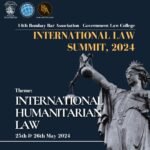The International Court of Justice will start hearing ‘Kulbhushan Jadhav’ case between India and Pakistan from 18th February(Today). The matter will be heard amidst high tensions between the two countries following the terrorist attack on February 14 that claimed the lives of 40 CRPF jawans.
The hearing timings scheduled for the Jadhav Case are as follows: Monday 18 February (10 a.m.-1 p.m.)-Tuesday 19 February (10 a.m.-1 p.m.)-Wednesday 20 February (3 p.m.-4.30 p.m.)-Thursday 21 February (4.30 p.m.-6 p.m.) The hearings will also be streamed live on the Court’s website and on UN Web TV.
Senior advocate Harish Salve is leading the team of lawyers representing India. Khawar Qureshi QC will head the Pakistan team.
International Court of Justice bench presided by President Abraham, which will be followed tomorrow by Pakistan’s reply. There is a second round of arguments on 20th and 21st February.
Senior Advocate Harish Salve made submission for India
- First issue relates to construction of Article 36 of Vienna Convention. Second issue relates to relief. Restitutio in integrum is basic principle, Salve for India.
- “Pakistan is embarrassed to disclose the judgment in the Jadhav case, the charges against him, and the evidence. The story has always been strong on rhetoric and weak on facts”, Salve
- Facts of the case. Pakistan was bound to grant consular access. Facts seems to suggest that even Jadhav was not made aware of his right to consular access.
- First Issue : Article 36 requires officials of receiving state to inform sending state about the detention of the citizens of latter. Consular officers shall be free to communicate with nationals of the sending State and to have access to them.
- Interpretation of Article 36 must be informed in relation to human rights
- Restrictive interpretation would be contrary to plain terms of Article 36. Consular access must be granted before trial is finished. This case involves an egregious breach of Article 36.
- Bilateral treaties can only supplement Vienna Convention. Nothing in India-Pakistan treaty that goes against Article 36 of Vienna Convention.
- Article 73(2) would apply to the case. Article 30 of the Vienna Convention on the Law of Treaties (VCLT) does not override Article 73(2) of the Vienna Convention on Consular Relations
- Article 5, 9, and 10 of Universal Declaration of Human Rights, which deal with rights of arrested and detained persons.
- Strictest and most rigorous guarantees must be undertaken in cases of death penalty, Salve cites from a judgment of an Inter-American court.
- As per decisions in Medellin, Avena etc, Article 36 has been recognized as a rubric for human rights.
- Interplay between Article 36 of Vienna Convention and Article 14 of the ICCPR.
- Cases cited by Pakistan have no relevance to present case.
- Pakistan using ICJ as a platform for propaganda. That in itself in an abuse of the court process.
Reliefs Sought by Salve
- A relief by way of immediate suspension of the sentence of death awarded to the accused.
- A relief by way of restitution in integrum by declaring that the sentence of the military court arrived at, in brazen defiance of the Vienna Convention rights under Article 36, particularly Article 36, paragraph 1 (b), and in defiance of elementary human rights of an accused which are also to be given effect as mandated under Article 14 of the 1966 International Covenant on Civil and Political Rights, is violative of international law and the provisions of the Vienna Convention; and
- Restraining Pakistan from giving effect to the sentence awarded by the military court, and directing it to take steps to annul the decision of the military court as may be available to it under the law in Pakistan.
- If Pakistan is unable to annul the decision, then this Court to declare the decision illegal being violative of international law and treaty rights and restrain Pakistan from acting in violation of the Vienna Convention and international law by giving effect to the sentence or the conviction in any manner, and directing it to release the convicted Indian national forthwith.
Read India’s application here.
Source: LiveLaw, Barandbench




![Call for Campus Ambassadors by Our Legal World [2 Months; Virtual]: Apply by June 15](https://www.ourlegalworld.com/wp-content/uploads/2024/06/Logo-New-136x150.png)


